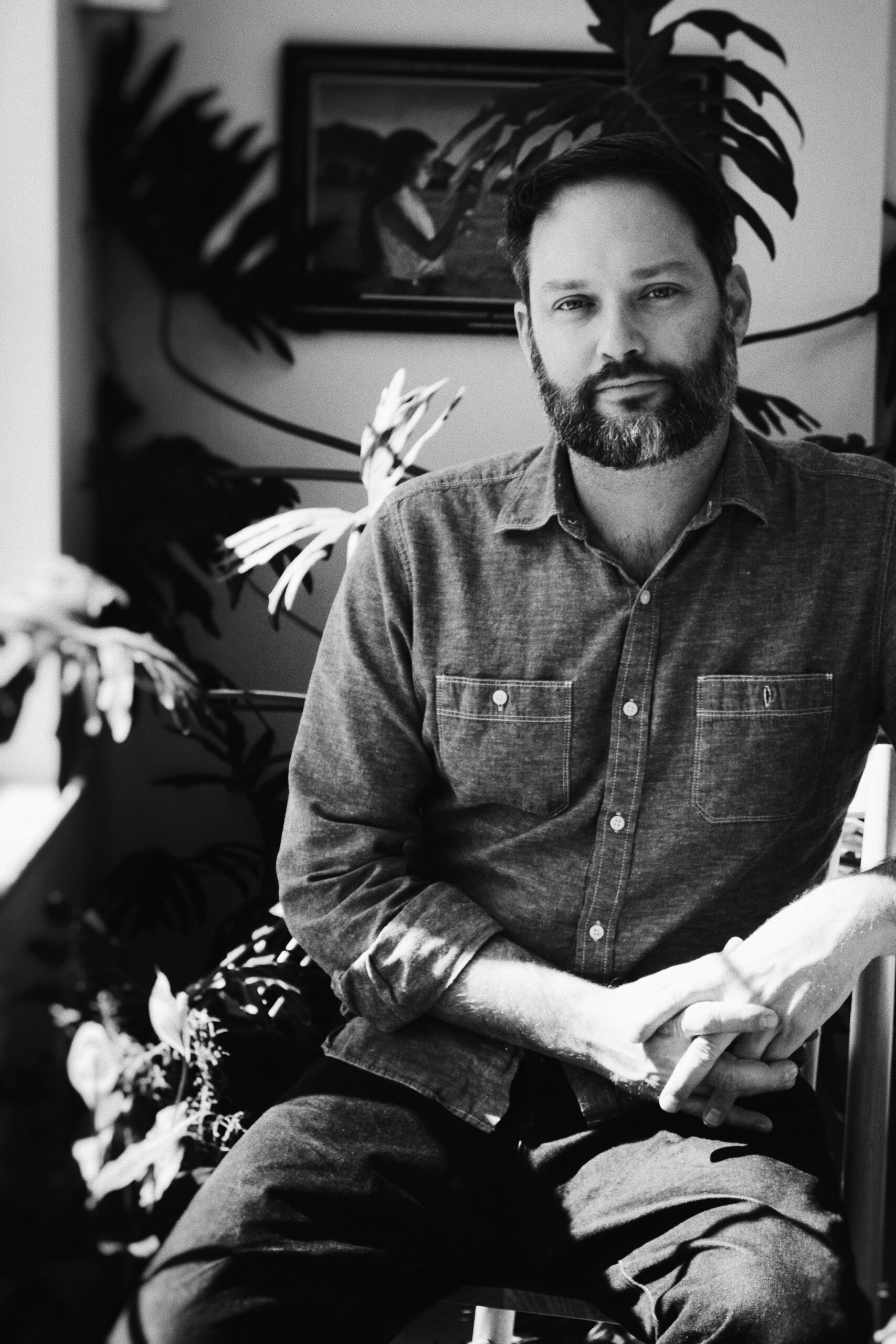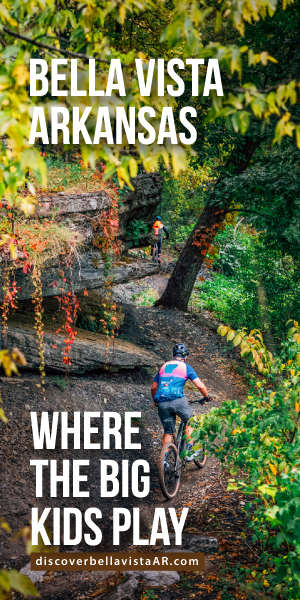Bryan and Bernice Hembree, two of the Fayetteville Roots Festival co-founders, are also a husband and wife duo, Smokey & The Mirror. The two of them have toured nationally/internationally over the past decade while continuing to grow the festival at home. Their band, which recently released a new album, “Here & Now,” has supported tours for Old Crow Medicine Show, The Wood Brothers, I’m With Her, Elephant Revival and John Fullbright. The twosome spearhead planning on the artist side of the August festival, creating a cohesive lineup with both national as well as local artists who play a role in making Northwest Arkansas a cultural hotspot.
Jerrmy Gawthrop is a co-founder of the Fayetteville Roots Festival, born in Fort Wayne, Indiana, and now calls Fayetteville home. Gawthrop leads the culinary side of the Fayetteville Roots Festival with experience producing festivals and events since 2002. As the co-founder of Wood Stone Pizza, he has years of culinary experience, which he applies when planning each year’s lineup.
Why did you start the Fayetteville Roots Festival and has it accomplished what you set out to do?
The first year was a gathering of musical friends and hosted at Jerrmy’s restaurant Greenhouse Grille. It was a result of Bryan and I (Bernice) hosting musicians for house concerts coupled with Jerrmy’s willingness to include music in his restaurant. The community really enjoyed that first festival and gave support and encouragement to make it happen again.
Each year we set out to bring in fantastic artists from both the music and the food world and each year we seem to find something more to add. Those additions have accomplished many milestones, checked things off our bucket list and brought smiles and tears to our faces.
Why did you mix food and music? What are the challenges to that approach? What are the benefits?
We feel that food and music are two creative outlets that make Fayetteville and Northwest Arkansas a beloved cultural hotspot…and they are literally our roots with Jerrmy as the culinary creative force behind Wood Stone Pizza and me [Bernice] and Bryan producing new music with Smokey & The Mirror.
One of the challenges is making sure the focus and messaging of the festival is cohesive and not disjointed, meaning, we don’t want it to lean chef-heavy one year and music-heavy another. We learn every year how to improve upon the previous year’s festival and how to equally represent all the amazing talent. We want our community to explore both the food and music because the benefits of this combination are endless. The festival leaves the community’s bellies and ears fulfilled and ready to learn about these artists and chefs in more depth.
The festival is now a regional event. Why was that decision made? What impact has that had on logistics? What has been the challenges and successes of that expansion?
While we love Fayetteville and call it home, Northwest Arkansas has so many talented artists and chefs. As the festival continues to grow, other areas in the region are included in our expansion plans. This works out well since some of our chefs utilize the amazing space at Brightwater: Center for the Study of Food in the 8th Street Market for both food prep and student engagement, and other partner venues such as The Hive at 21c Museum Hotel.
The successes include a larger interest from attendees outside of Fayetteville and that broadens the opportunity to more deeply engage that larger community. These are two elements we feel passionate about. With expansion comes more work, of course, connecting with partners, venues, volunteers and getting the message out to a wider audience. While these could be categorized as challenges, we see them more as a chance to continue to hone and refine the festival and our work.
What role do festivals like Roots have in developing a regional brand narrative and how have you seen the area benefit?
While Northwest Arkansas is home to the University of Arkansas and major employers like Tyson, J.B. Hunt and Walmart that continue to attract more people to the region, we believe cultural organizations such as museums, art centers, music venues, vibrant farmers markets and festivals also play an important role in that attractiveness.
These cultural assets serve as cornerstones for how longtime residents explain their community to others and how new-to-NWA residents explore and engage with the community as they settle into life here. There is also something unique about a festival or cultural destination in its ability to attract visitors from outside the region and state. Someone may read about NWA and decide to come see what all the talk is about.
At this level, a festival becomes a welcome center for how visitors see and engage with our community. Festivals and cultural destinations are a chance for residents to engage with visitors, elicit a tangible sense of community pride and gain an understanding about the genuine and growing interest in our area from a regional and national level. This invitation to explore also extends to how we go about bringing in national musicians and chefs to join local musicians and chefs. There is a learning process as artists and chefs from outside the region gain true perspective on the strength and talent of our creative community. In turn, our local creatives find their belief in this community strengthened by a musician or chef that chooses to make a stop in NWA.
This mutual learning extends to the community at large as well. It makes our day to hear someone say, “I’ve never heard of this band,” or “I’ve never tasted anything like this.” That person is standing in Northwest Arkansas, whether as a visitor or as a resident, when they discover. This process ties place and home to discovery in a way that is indelible.
We have often said that the Roots Festival is not just music on a stage or food on a plate, but rather our community on a stage and our community on a plate. We are honored when we hear someone from the NWA community talk about Roots Festival as an anchor experience of their year. We take that very seriously and it pushes us to keep moving forward.
Why translate the brand into a physical location and what is the goal of the Roots HQ?
As I mentioned above, Bryan and I [Bernice] used to host house concerts in our home. The idea for an intimate and engaging community festival was born out of those house concert gatherings. The concerts were a beautiful way to connect music and the community.
With the new space, the Roots HQ [in the historic Guisinger Music House], we feel like we’re able to gather our family and friends and host an intimate show again. The Roots HQ also gives us much-needed office, meeting, creative and storage space. It serves as breathing room and a laboratory for the festival itself. Our goal is not to be a full-fledged music venue, but a curated space for year-round music, food and educational events. We see it as a launching pad to continue engaging with the community and to refine and redefine what role the festival plays in Northwest Arkansas.
Please share some lessons learned and ways you changed an approach to strengthen the festival.
Bryan is always reminding us that this may be the 10th year for the festival, but we only have 30 actual festival days to practice our methods. Each year, we learn a better tactic or approach and then must wait a whole year to implement something new. This can be maddening at times, but we have found that it elicits the need to always be visioning and thinking long-term.
We think this has given the festival a chance to succeed long-term. Our desire to improve the festival leaves us saying, “We will fix that for next year,” which then in turn means we make a commitment to “next year” by simply evaluating what we could be doing better.
And the No. 1 lesson learned: Always have good volunteers.



